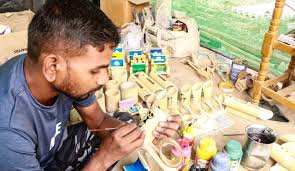Establishing businesses is important for a country’s progress as it augments economic and employment growth. State and central governments are continuously launching new and attractive schemes to encourage their citizens to come up with innovative business ideas. Setting up an enterprise depends on one’s capacity, which differs from person to person. If the enterprise must come up in a rural environment, the dynamics are more complex compared to the urban context.
Rural enterprises are business entities, which by the means of effective use of local resources, promote revenue generation and act as agents of social change at the grassroots level. These entities not only play a pivotal role in the wholistic development of the rural economy but also contribute to the economic growth of our nation. The establishment of a large number of profitable enterprises in a region can bring in government investment, attract private participation, generate local employment, bring partnerships and secure funding apart from channelising idle savings into business entities.
According to the Government of India, “Any industry located in a rural area, village or town with a population of 20,000 or below and an investment of INR three crores in plant and machinery is classified as a village industry.” It is a revised definition of the previous one provided by Khadi & Village Industries Commission.
As of March 31, 2022, India has more than 63 million MSMEs, out of which about 94 per cent are micro-enterprises. According to official data released on April 30, 2022, the country’s 6.33 crore MSMEs employ about 12 crore workers. According to World Bank Data 2019, about 65 per cent of the Indian population, most of them (about 58 per cent, as per 2018-19 PLFS data) earn their livelihood from agriculture and allied sectors.

Objective of Rural Entrepreneurship Development Programme
The Rural Entrepreneurship Development Programme aims to develop entrepreneurial and activity-oriented skills among the unemployed rural youths willing to create small or micro-enterprises by assisting agencies and NGOs involved in the conducting of Entrepreneurship Development Programs. Hence, the Rural Entrepreneurship Development Programme indirectly supports entrepreneurs through various agencies and NGOs.
Challenges faced by rural entrepreneurs
While India has marginally improved its ranking in terms of the ease of doing business index, the challenges and concerns faced by rural entrepreneurs in running and scaling their enterprises persist.
The concerns range from the prevalent societal and gender-based biases to a lack of understanding of business, entrepreneurship and access to the requisite skills essential to run such enterprises. The entrepreneurs who have the courage to work on a business idea often face challenges in understanding the needs of the market, the viability of their product and its suitability for manufacture.
Furthermore, those enterprises who manage to establish themselves in the market and generate some early-stage revenue often face difficulties. These range from inconsistent market linkages, severe competition from urban markets, a lack of infrastructural facilities and logistical challenges, inadequate understanding of the government support mechanisms available for them to unskilled labour for the effective delivery of product/service.
Other challenges include the availability of working capital, the adoption to technology and the inability to diversify their products range.
Rural Entrepreneurship Development Programs
- REDPs are conducted for a certain skill and unemployed rural youth are trained in these programs.
- The trainee has to be in the age limit of 18 and 50 years.
- Training period could differ from a minimum period of 4 weeks to a maximum period of eight weeks.
- Each program would support about 25-30 participants.
- Programs are held with the support of NGOs and the NGOs must be a registered and with a minimum experience of 3 years.
- Programs could be residential or non-residential.
- The NGO must have essential infrastructure, faculty support of their own or invite guest faculty.
Pre-Training Phase
In the pre-training phase, a detailed survey is done for identifying prospective business activities or market. Then publicity, awareness and motivational campaign are conducted for Entrepreneurship development in coordination with Banks or Government Departments or other NGOs.
Training Phase
Entrepreneurship Development Programs are typically 6-8 weeks long. Training module comprises the following:
- Achievement motivation
- Opportunity identification and guidance
- Knowledge related to supporting agencies and schemes
- Preparation of project reports/profiles
- Management of resources (men, material, money)
- Marketing aspects
- Book-keeping/Accounting
The training program would include case-studies on prospective activities, field visits, practical work, visit to thriving units, etc.,
Post-Training
Post training, the program endeavours to facilitate in the hand-holding or syndication of bank loan or creation of the MSME unit for a period of a minimum of 2 years.
Recovery roadmap
India has made tremendous progress towards creating a new business environment for enabling an increased participation of stakeholders in the workforce via enterprise creation.
However, acceleration of these numbers is possible through the introduction of some key models, such as a marketing cooperative to promote products manufactured by rural enterprises thereby eliminating middlemen. The establishment of common facility centres, particularly for production, can also boost rural entrepreneurship. Building business acumen through capacity building and training is crucial for entrepreneurial success. It, coupled with an access to financial linkages at concessional interest rates, flexible repayment options and waiving of collateral security will spur the growth in this sector.
FAQs
What is the Rural Entrepreneurship Development Program (REDP)?
The Rural Entrepreneurship Development Program (REDP) is an initiative aimed at promoting entrepreneurship in rural areas. It provides training, resources, and support to rural individuals to help them establish and sustain small businesses, encouraging economic growth and employment in rural communities.
Who implements the REDP?
REDP is typically implemented by various government agencies, financial institutions, NGOs, and organizations focused on rural development. In India, the program is often supported by institutions like the National Bank for Agriculture and Rural Development (NABARD) and other rural development bodies.